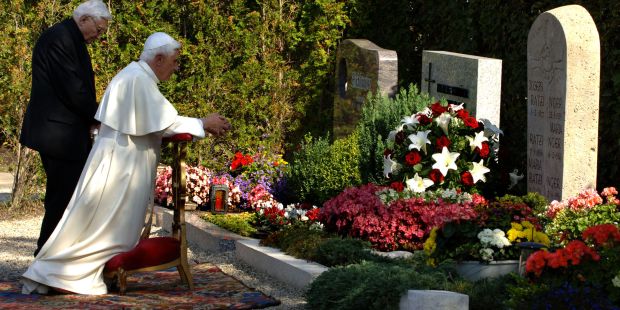- Feb 5, 2002
- 166,632
- 56,265
- Country
- United States
- Faith
- Catholic
- Marital Status
- Married
- Politics
- US-Others
Review, or read for the first time, this profound but accessible explanation, condensed in just four paragraphs.
Spe Salvi, Benedict XVI’s encyclical on hope, includes eight paragraphs on the theme of our judgment, “as a setting for learning and practicing hope.”
Part of what the German Pontiff illustrates in that section is purgatory. He says, “The judgement of God is hope, both because it is justice and because it is grace.”
Here is a four-paragraph excerpt of the section, particularly fitting for our prayer and reflections on All Souls Day. The emphases in bold are our own.
__
45. This early Jewish idea of an intermediate state includes the view that these souls are not simply in a sort of temporary custody but, as the parable of the rich man illustrates, are already being punished or are experiencing a provisional form of bliss. There is also the idea that this state can involve purification and healing which mature the soul for communion with God. The early Church took up these concepts, and in the Western Church they gradually developed into the doctrine of Purgatory. We do not need to examine here the complex historical paths of this development; it is enough to ask what it actually means. With death, our life-choice becomes definitive—our life stands before the judge. Our choice, which in the course of an entire life takes on a certain shape, can have a variety of forms. There can be people who have totally destroyed their desire for truth and readiness to love, people for whom everything has become a lie, people who have lived for hatred and have suppressed all love within themselves. This is a terrifying thought, but alarming profiles of this type can be seen in certain figures of our own history. In such people all would be beyond remedy and the destruction of good would be irrevocable: this is what we mean by the wordHell [37]. On the other hand there can be people who are utterly pure, completely permeated by God, and thus fully open to their neighbours—people for whom communion with God even now gives direction to their entire being and whose journey towards God only brings to fulfilment what they already are [38].
Continued below.

 aleteia.org
aleteia.org
Spe Salvi, Benedict XVI’s encyclical on hope, includes eight paragraphs on the theme of our judgment, “as a setting for learning and practicing hope.”
Part of what the German Pontiff illustrates in that section is purgatory. He says, “The judgement of God is hope, both because it is justice and because it is grace.”
Here is a four-paragraph excerpt of the section, particularly fitting for our prayer and reflections on All Souls Day. The emphases in bold are our own.
__
45. This early Jewish idea of an intermediate state includes the view that these souls are not simply in a sort of temporary custody but, as the parable of the rich man illustrates, are already being punished or are experiencing a provisional form of bliss. There is also the idea that this state can involve purification and healing which mature the soul for communion with God. The early Church took up these concepts, and in the Western Church they gradually developed into the doctrine of Purgatory. We do not need to examine here the complex historical paths of this development; it is enough to ask what it actually means. With death, our life-choice becomes definitive—our life stands before the judge. Our choice, which in the course of an entire life takes on a certain shape, can have a variety of forms. There can be people who have totally destroyed their desire for truth and readiness to love, people for whom everything has become a lie, people who have lived for hatred and have suppressed all love within themselves. This is a terrifying thought, but alarming profiles of this type can be seen in certain figures of our own history. In such people all would be beyond remedy and the destruction of good would be irrevocable: this is what we mean by the wordHell [37]. On the other hand there can be people who are utterly pure, completely permeated by God, and thus fully open to their neighbours—people for whom communion with God even now gives direction to their entire being and whose journey towards God only brings to fulfilment what they already are [38].
Continued below.

Pope Benedict XVI's teaching on purgatory in 4 paragraphs
Review, or read for the first time, this profound but accessible explanation, condensed in just four paragraphs from his encyclical on hope, Spe Salvi.
